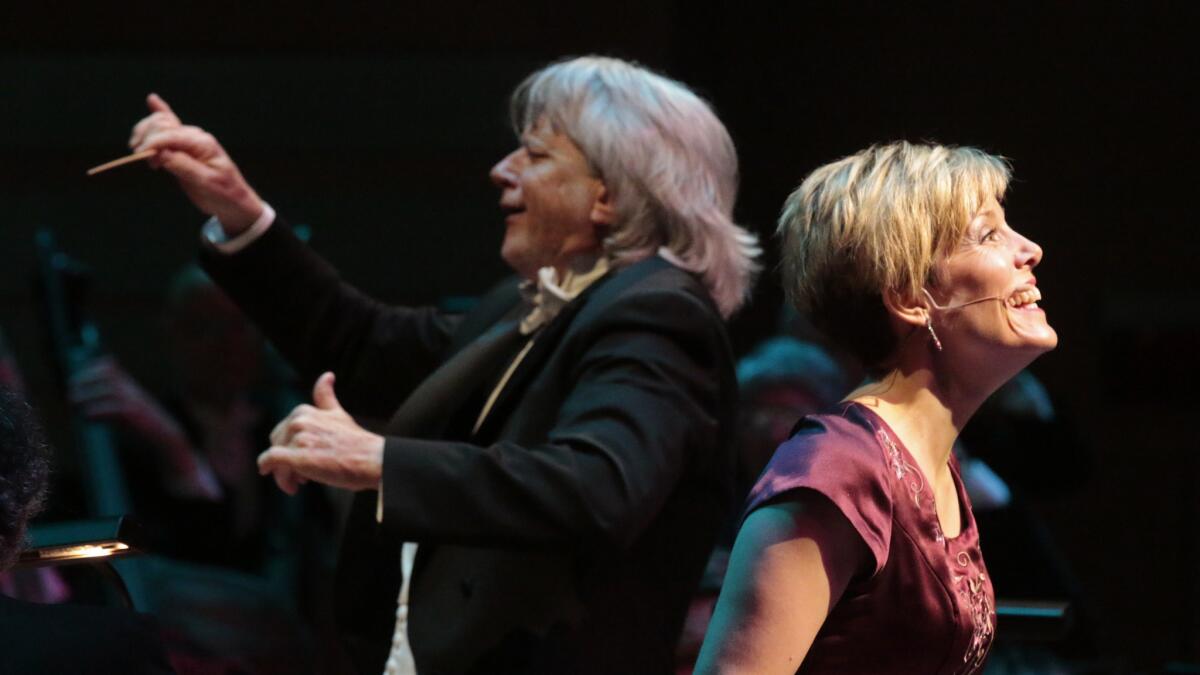Review: Carl St.Clair leads Pacific Symphony in Leonard Bernstein ode

- Share via
On a gloomy damp and cold Sunday afternoon in August 1990, Leonard Bernstein conducted his last concert. Suffering from the late stages of emphysema, he gasped for air while leading an incomparably urgent performance of Beethoven’s Seventh Symphony at Tanglewood, the Boston Symphony’s outdoor summer home in the Berkshires.
Bernstein did not, though, have the strength to conduct the premiere of his newly orchestrated final work, “Arias and Barcarolles,” so he turned that over to the Boston Symphony’s 38-year-old assistant conductor, Carl St.Clair. A song cycle for two singers, it contains Bernstein’s last thoughts.
But if the concert proved a deeply affecting farewell, it also fostered a legacy. Less than two months later, St.Clair began his first season as music director of the Pacific Symphony with a program that also ended with Beethoven’s Seventh. It was, Martin Bernheimer wrote in The Times, “a new beginning.”
Thursday night, St.Clair paid tribute to his mentor at the Renée and Henry Segerstrom Concert Hall in Costa Mesa. He told the audience that it would have been unthinkable not to include a Bernstein program in his 25th season as the Pacific Symphony music director.
Never having programmed the neglected “Arias and Barcarolles” with his orchestra, he finally offered a taste of the important cycle. Two of the eight songs were part of an all-Bernstein evening that included the Second Symphony, the overture “Slava!” and excerpts from Bernstein’s most popular theater scores. Dawn Upshaw was to have been the soprano soloist. She was ill and was replaced by Celena Shafer. Bernstein’s daughter, Jamie, served as co-host with St.Clair.
It was a mixed bag, but a touching mixed bag.
The only big piece was the Second Symphony, subtitled “The Age of Anxiety,” which is also a piano concerto. There is a sense that the unconventional 1949 score, based on W.H. Auden’s poem about four lost souls in a New York bar during the dark days of 1939, is also neglected. St.Clair asked how many in the audience had never heard it, and most raised their hands.
But he had performed it with the Pacific Symphony in 2002. Gustavo Dudamel played it with the Los Angeles Philharmonic in 2010 and toured it. Bernstein recorded it four times.
St.Clair’s soloist was, as in 2002, Benjamin Pasternack, the pianist also having worked with Bernstein. The symphony somewhat follows the poem, setting the sodden barroom scene with two bluesy clarinets in counterpoint. The solo piano writing is all over the map — there is swing and grand oracular statement.
Doubt pervades the symphony, but it ends strongly, one of Bernstein’s many efforts to find faith. He was never convinced, always searching, which is one of the reasons why his music continues to matter.
Pasternack followed a satisfyingly straightforward “Age of Anxiety” performance with two solo virtuosic piano etudes he has made (but he said not yet written down) from Bernstein’s orchestral suite of dance interludes based on the musical “On the Town.” They sound impressive on the piano but top heavy.
The second half began with St.Clair leading an aptly showy performance of “Slava! A Political Overture,” written for Mstislav Rostropovich. From behind, St.Clair had Bernstein’s body language. If I had closed my eyes, I might have imagined Bernstein was conducting. St.Clair has made the Pacific Symphony, in a quarter century, into a sizzling ensemble.
Shafer brought a brilliant vocal technique to numbers from “Wonderful Town” (“A Little Bit of Love”), “West Side Story” (“Somewhere”) and “Candide” (“Glitter and Be Gay”). She also hammed them up.
The two numbers from “Arias and Barcarolles,” which the ailing Bernstein had the young Chinese composer Bright Sheng orchestrate, were remembrances of youth. In “Little Smary,” Bernstein set a cute story his mother would tell him to put him to sleep. “Greeting” simply sets Bernstein’s own text about the purity of birth. Shafer made them moving, but she was amplified, and too reverberantly, to make a full effect.
More youth. Three emerging singers — Erin Theodorakis, Marcus Paige and Elliott Wulff — sang the Prelude to Bernstein’s pop opera, “Trouble in Tahiti,” again given a kind of muted amplification that ironically made them probably harder to hear than they might have been without the microphones.
St.Clair ended by standing on the side of the stage with his arms around Shafer and Jamie Bernstein, letting the orchestra play the “Candide” Overture without a conductor, reminding us of who was missing. It was impressive.
Twitter: @markswed
------------
Pacific Symphony: ‘For the Love of Bernstein’
Where: Renée and Henry Segerstrom Concert Hall, Costa Mesa
When: 8 pm. Saturday
Cost: $25-$185.
Info: www.pacificsymphony.org
More to Read
The biggest entertainment stories
Get our big stories about Hollywood, film, television, music, arts, culture and more right in your inbox as soon as they publish.
You may occasionally receive promotional content from the Los Angeles Times.











